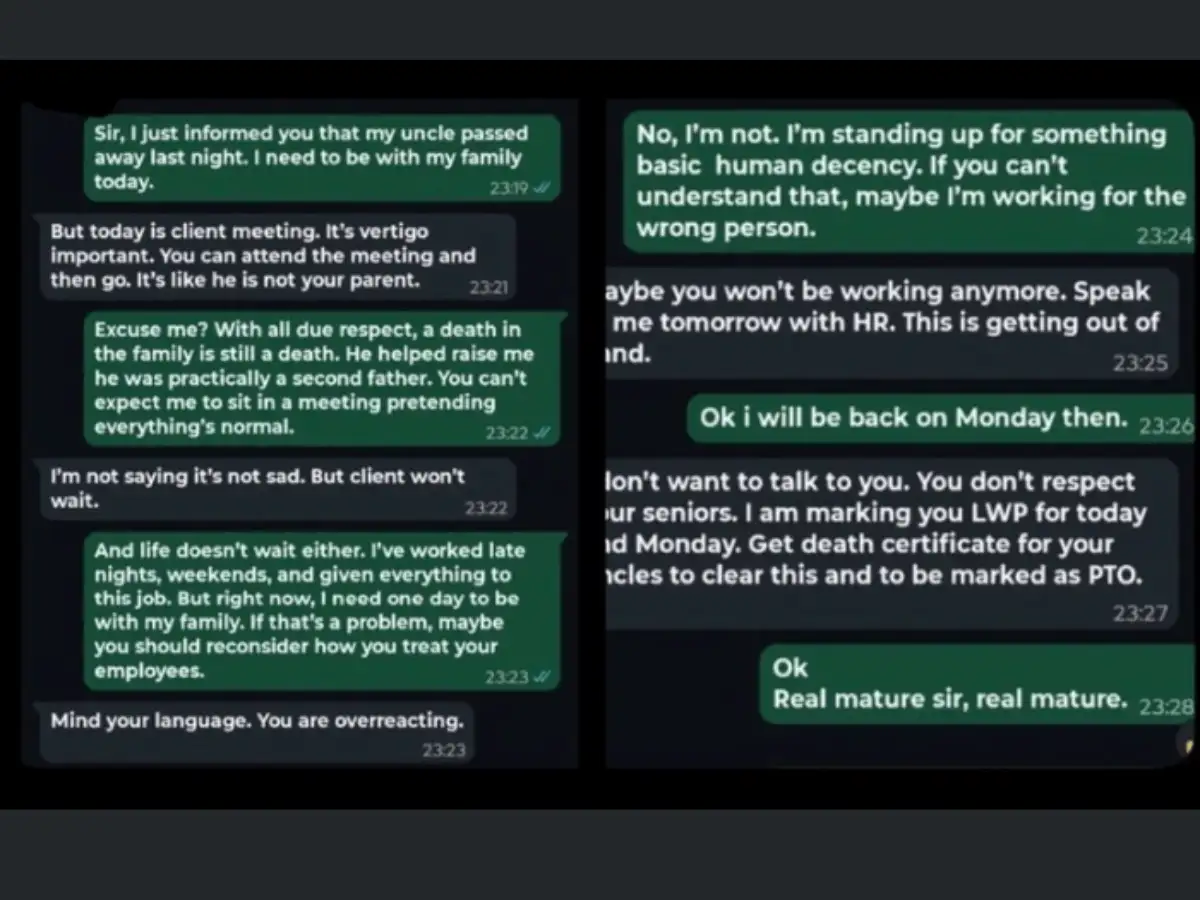A recent chat between a Gen Z employee and his manager has gone viral, opening a larger conversation about toxic leadership and the importance of empathy in the modern workplace. For years, many Indian employees have silently tolerated poor treatment due to job insecurity. But today’s younger generation is reshaping workplace culture by openly questioning unfair behaviour and demanding respectful communication.
Gen Z Worker Calls Out Manager’s Insensitive Response
The viral screenshot begins with the young employee informing his manager about a family tragedy—his uncle had passed away, and he needed the day off. Instead of offering condolences, the manager immediately asked him to attend a planned client meeting before leaving. This cold response shocked many who later saw the conversation online.
The employee explained that his uncle was like a parent to him, and he was emotionally unable to attend any meeting. Despite this, the manager downplayed his grief and replied that it was “not like losing a parent,” a comment that many netizens later called deeply insensitive.
Employee Pushes Back Against Toxic Behaviour
Hurt by the dismissive attitude, the employee firmly responded. He reminded the manager of the long hours and weekend work he had already contributed. He said that asking for one day to grieve was absolutely reasonable and that treating a grieving person as if nothing happened was unfair.
This reply angered the manager, who accused him of overreacting and being disrespectful. The situation escalated further when the manager threatened HR action, marking his leave as LWP (Leave Without Pay), and asked for a death certificate to justify his absence—something many netizens found outrageous.
Internet Strongly Supports the Gen Z Employee
The conversation quickly spread across social platforms. Most users supported the employee for refusing to accept toxic behaviour. Many said that no employee should be forced to “prove” their grief or work during a tragedy. Some users even commented that managers showing such behaviour should face disciplinary action themselves.
However, a few people felt the employee could have ended the chat instead of arguing further. Still, the majority agreed that this incident reflects how Gen Z is standing firm against poor leadership and encouraging healthier workplace values.
Conclusion
The viral chat between the Gen Z employee and his insensitive boss has started an important conversation about workplace empathy. While older generations often endured toxic behaviour silently, today’s employees expect respect, understanding, and basic humanity—especially during personal crises. This incident is a reminder that leadership is not just about managing work, but also about showing compassion. As more people speak up, workplaces across India may finally move towards healthier, more human work cultures.
FAQs
What triggered the viral workplace conversation?
The chat went viral after a manager refused to show empathy when the employee informed him about a death in the family.
Why did people support the Gen Z employee?
Many felt he was right to demand basic respect and emotional understanding during a personal tragedy.
Did the manager respond fairly?
Most netizens felt the manager’s reaction—especially asking for a death certificate—was extremely insensitive.
What does this incident say about Gen Z?
It shows Gen Z values mental health, boundaries, and respectful workplace communication, and they are ready to call out unfair behaviour.
Will incidents like this change workplace culture?
Yes. As more employees speak up, companies are being pushed to adopt healthier, more empathetic work environments.

